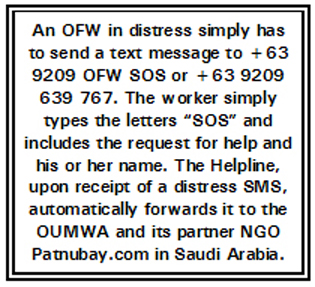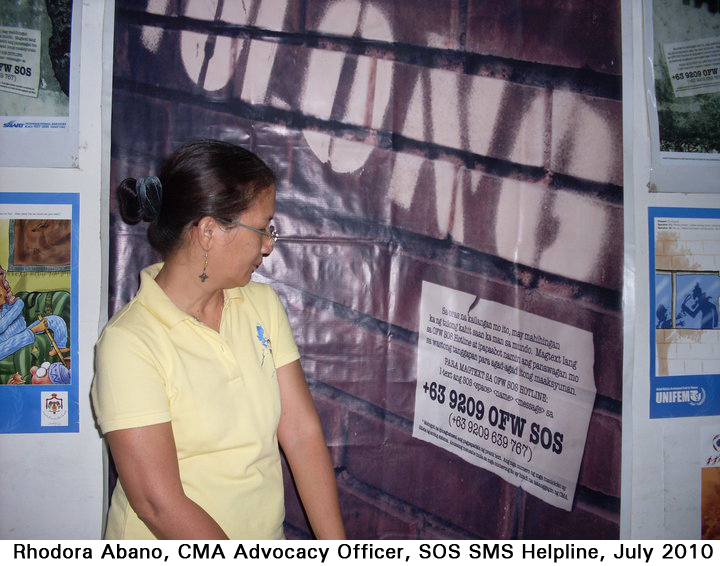
 27 February 2011
27 February 2011AFTER years of languishing in jail, some 150 overseas Filipino workers have been granted amnesty by Saudi Arabia King Abdullah bin Abdul–Aziz and may finally be repatriated by the government.
Last Year in February 2010, the OFWs in Al Hair Central Jail sent several text messages through the SOS SMS Helpline of the Center for Migrant Advocacy (CMA) requesting assistance in facilitating their immediate mass repatriation. Shortly after their texts for help reached Manila, the CMA was informed that Philippine embassy representatives visited the detainees and started working on their cases. The OFWs said prison officials have asked the embassy to prepare their passports and return tickets.
The SOS SMS Helpline, which celebrated its fifth anniversary on Valentine’s Day, is part of the CMA’s case referral system where a single text for help activates a network of nongovernmental organizations and government agencies to come to the rescue of an OFW in distress. The 24/7 text–based ICT mechanism was conceptualized and developed by OFWs and implemented in cooperation with various CMA partner NGOs worldwide, as well as with the Office of the Undersecretary of Migrant Workers’ Affairs (OUMWA) of the Department of Foreign Affairs.
The system gives government and NGOs the opportunity to respond or intervene in a timely, adequate and efficient manner, particularly where the OFW’s life, safety or well–being is a critical consideration. CMA’s role is to ensure that the OUMWA and/or the relevant embassy or consulate helps the OFW in distress.
The CMA marked the helpline’s fifth year with a roundtable discussion, attended by representatives from five migrant NGOs from the church sector (Catholic Bishops’ Conference of the Philippines–Episcopal Commission for Pastoral Care for Migrants & Itinerant People, Association of Major Religious Superiors of the Philippines–Migrants Program, Center for Overseas Workers, Scalabrini Lay Association, and Daughters of Charity Migrants Desk), plus Coalition Against Trafficking of Women in Asia Pacific, Foundation for Media Alternatives, the labor department’s International Labor Assistance Bureau (ILAB) and the Overseas Workers’ Welfare Administration (OWWA).

Sana said the CMA takes government to task in terms of promoting and protecting the rights of OFWs and their families, but it has no intention of taking over this job. Dyz Pumarada of CBCP–ECMI commended the helpline for providing a channel to distressed OFWs, but expressed concern about how government responds and intervenes.
CMA Advocacy Officer Irynn Abano said the government cannot hope to cope with distressed OFWs, not to mention the social costs of migration, for as long as it continues to pursue labor export.
OWWA’s Ma. Melinda Rada said while there are some government personnel who do not perform their job properly, there are also those who are efficient in assisting OFWs. She said OFWs and their families have high expectations of government but do not understand that some problems, such as those requiring filing of cases and exit visas, take a long time to resolve.
ILAB’s Mario Vallejos, on the other hand, said that OFWs sometimes fail to provide enough data to enable government to assist them. The CMA and ILAB agreed to identify the minimum information needed by government to act on a text for help.
FMA’s Len Mesina inquired about the system’s gender sensitivity, particularly in cases of violence against migrant women such as rape.
Sana noted the difficulty in “engendering responses” from victims of gender–based violence because of the social, cultural and legal environment in Saudi Arabia. She cited as an example a Filipina who is raped and gets pregnant may be jailed as per Shariah Law.
Chat Garcia–Ramilo of the Association for Progressive Communications (APC) said CMA should lobby for OFWs’ right to keep their cell phone — the gadget that is often a domestic worker’s sole lifeline inside the employer’s house. Usually, an employer confiscates it to prevent the OFW’s contact with the outside world.
Chat Pinalac of AMRSP said the helpline addresses OFW crises, alerts government and facilitates immediate response to the OFW in distress. Sister Teresa Lirio of DCMD added that more effective monitoring and evaluation tools are needed though.
Al Alegre of FMA proposed a second roundtable discussion to explore collective responses of migrant NGOs to optimize cooperation and minimize overlap of functions.
Related Articles:
 Home | Aims and Objectives of Solidarity Philippines Australia Network | About Kasama
Home | Aims and Objectives of Solidarity Philippines Australia Network | About Kasama 
Search the SPAN Web